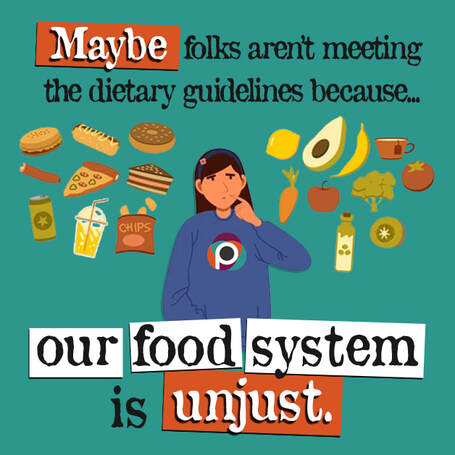 Have you heard? The new 2020-2025 Dietary Guidelines for Americans (DGAs) were recently released this past month. As we move into 2021, the timeliness and, also the irony, of the release of the guidelines is not lost on us. Timely, in that they were released just in time as 2020 turned to a close. And ironic, that the urge to focus on an ideal diet in midst of an awful pandemic - that is intimately intertwined with the longstanding injustices that are part of our food and health systems – with increased food insecurity, disruptions to our food system, political strife, and food worker injustices. The light of this context make the DGAs feel like a being offered a five-dollar coupon for an on-flight beverage after your luggage was lost and your flight was canceled. But, yet, despite these realities, our understanding of how we all SHOULD eat marches on. The evolution of the science that goes into the DGAs is nothing to scoff at. This most recent guidance marks the 9th edition of the DGAs which have been released every five years since 1980. The process of what goes into the final document is extensive. Final guidelines are made following an extensive scientific review. The committee’s expertise and understanding of the dietary guidelines is well researched, understood, and evidence based, though it is worth noting that concerns related to food industry bias have been raised in the field. It is also worth noting that the intent of the DGAs are in the interest of public health. The new DGAs state that key tenants of writing the guidelines are that it must: represent the totality of the evidence examined, address the needs of federal programs, reduce unintended consequences, follow best practices for developing guidelines, and use plain language. For many, these DGAs are useful for making functional food choices. In reality, humans don’t just eat for nutrition. Nobody will argue that nutrition matters; however, food is also a source of pleasure, of community, of family, of history and tradition, and life. Context also includes social and historical constructs and systems that influence choice, availability, and relationships with food. We hold in equal regard the context of eating as we do the nutrition the food provides. The complexities behind the reality of our relationships with food, and why we champion certain foods and vilify others are deep. And there are consequences, unintended or not, from failing to include these contexts. From solely an individual behavior lens, research is continuing to mount on the impact of restriction and feeling restricted on our relationships with food with expectations that individuals should meet nutrient guidelines and patterns. Even expecting individuals to make nutrition the priority of every meal, greatly ignores the reality of life and role of psychology and environment in eating. Add in the context of poverty, food insecurity, trauma and loss of food traditions lecturing about healthy eating starts to feel like victim blaming. Our health, our diet, and wellbeing are intimately and intricately intertwined with larger systems that shape us. Things beyond individual responsibility and control. Deep rooted systems tied to historical and ongoing forms of racism, oppression, and poverty. There is design behind what is available to us and what shapes why we eat what we eat. We are happy to see that there is recognition of the importance of reducing unintended consequences, but do these words have meaning or just a placation? The truth is, despite 40 years of increasingly detailed guidance, Americans are no closer to achieving them. The guidelines acknowledge that over time, eating patterns in the United States have remained far below the dietary guidelines recommendations. These trends are evident across all socioeconomic levels. So why are we offering slightly modified guidelines over and over every five years and expecting a different result? What about holding the industry and systems that shape food choices accountable? Despite clear understanding of how increased sugar intake, salt and saturated fat impact health, food environments are no closer to matching the guidance. How can we expect Americans to prioritize nutrition when they are battling for basic needs, coping with injustice, and living in environments designed to add harm? Obviously, this context matters. So, when sharing and interpreting this information, in the face of the many reasons behind why people eat what they eat, let us resist the urge to double down and smugly argue “eat less, move more.” Perhaps it is time to instead, look deeper into the contexts not included, to listen and revise our approach. In the context of moving into 2021, with the light on systemic racism, structural issues, and systemic traumas, it is time to shift power. Maybe folks aren’t meeting the guidelines because our food system is unjust. How about we stop putting the burden of meeting the guidelines on the individual when the guidelines are better targeted to the system itself. We won’t see trends improve in meeting the dietary guidelines until the emphasis of meeting these guidelines is targeted back at not focusing on changing the individual, but rather changing the system.
0 Comments
Hear from our team members about the programs of Pinnacle Prevention and how we navigated the historically significant year of 2020 with our partners, clients, friends, and family. Thanks for such a successful year, even amid the challenges. |
Pinnacle Prevention BlogFollow our blog for tips, insights and conversations about healthy living. Archives
June 2024
Categories
All
|
Location |
|

